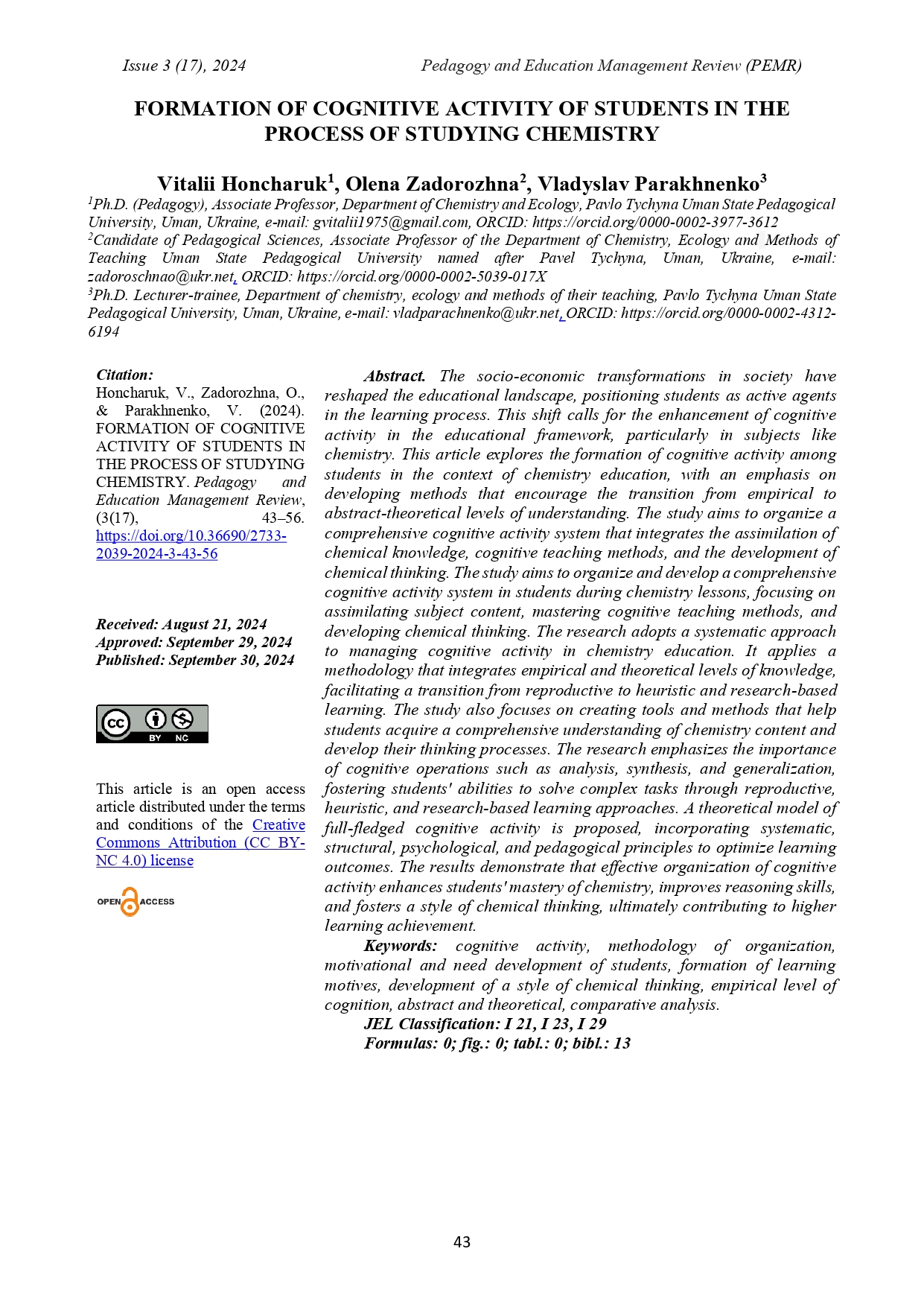FORMATION OF COGNITIVE ACTIVITY OF STUDENTS IN THE PROCESS OF STUDYING CHEMISTRY
DOI:
https://doi.org/10.36690/2733-2039-2024-3-43-56Keywords:
cognitive activity, methodology of organization, motivational and need development of students, formation of learning motives, development of a style of chemical thinking, empirical level of cognition, abstract and theoretical, comparative analysisAbstract
The socio-economic transformations in society have reshaped the educational landscape, positioning students as active agents in the learning process. This shift calls for the enhancement of cognitive activity in the educational framework, particularly in subjects like chemistry. This article explores the formation of cognitive activity among students in the context of chemistry education, with an emphasis on developing methods that encourage the transition from empirical to abstract-theoretical levels of understanding. The study aims to organize a comprehensive cognitive activity system that integrates the assimilation of chemical knowledge, cognitive teaching methods, and the development of chemical thinking. The study aims to organize and develop a comprehensive cognitive activity system in students during chemistry lessons, focusing on assimilating subject content, mastering cognitive teaching methods, and developing chemical thinking. The research adopts a systematic approach to managing cognitive activity in chemistry education. It applies a methodology that integrates empirical and theoretical levels of knowledge, facilitating a transition from reproductive to heuristic and research-based learning. The study also focuses on creating tools and methods that help students acquire a comprehensive understanding of chemistry content and develop their thinking processes. The research emphasizes the importance of cognitive operations such as analysis, synthesis, and generalization, fostering students' abilities to solve complex tasks through reproductive, heuristic, and research-based learning approaches. A theoretical model of full-fledged cognitive activity is proposed, incorporating systematic, structural, psychological, and pedagogical principles to optimize learning outcomes. The results demonstrate that effective organization of cognitive activity enhances students' mastery of chemistry, improves reasoning skills, and fosters a style of chemical thinking, ultimately contributing to higher learning achievement.
Downloads
References
Lukashova N.I. Methods of studying the periodic law of D.I. Mendeleev, the periodic system and the structure of the atom: a textbook for the school course of chemistry and methods of its teaching (using the technology of the credit-modular system of education. Nizhyn: Nizhyn Gogol State University, 2008. 87 с.
Burynska N., Velychko L. Teaching chemistry in grades 10-11 of secondary schools: a methodological guide for teachers. Kyiv: Perun, 2022. 240 с.
Velychko LP, Yaroshenko OG, Bondarchuk OG Didactic material on general chemistry. Kyiv: Rad. shk., 1990. 79 с.
Boyechko F.F., Naidan V.M., Grabovyi A.K. Laboratory and practical classes in organic chemistry. Kyiv: Rad. shk., 1984. 160 с.
Dmytriv G.S., Pavliuk V.V. General and inorganic chemistry. Study guide. Lviv: Publishing Center of Ivan Franko National University of Lviv, 2008. 300 с.
Methodical instructions for laboratory work in the discipline "General and Inorganic Chemistry", KhNAMG. 2009.
Romanova N.V. Fundamentals of chemical analysis. K. Irpin, 1998. 140с.
Anichkina O. V. Pedagogical conditions for training future teachers to conduct a school chemical experiment. Anichkina O.V. Young scientist. Pedagogical sciences. 2015. Т. 8 (23). Ч. 2. С. 102-105.
Kornilov M.Y., Bilodid O.I., Golub O.A. Terminology manual on chemistry: for teachers and teachers of chemistry and students of secondary schools. Kyiv: IZMN, 2008. 256 с.
Methods of teaching chemistry. Workshop: textbook. Kyiv: Vysha Shkola, 2004. 167 с.
Yaroshenko O. G., Novitskaya V. I. Tasks and exercises in chemistry: Study guide, ed. 5-е. Kyiv: Stanitsa, 2003. 234 с.
Shapovalov AI. Methods of solving problems in chemistry. Kyiv: Rad. shk., 1999. 85 с.
Nechypurenko P.P., Selivanova T.V., Semerikov S.O., Shenaeva T.O. Information and communication tools for the formation of research competencies of students in specialized teaching of chemistry. Information technologies and teaching aids, 2016. Т. 56. № 6. С. 10-29.
Modern lesson: Interactive learning technologies. Kharkiv: Osnova, 2003. 89 с.







